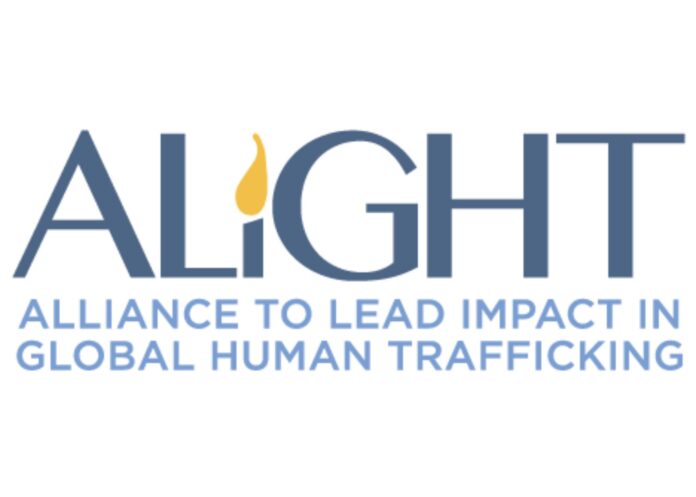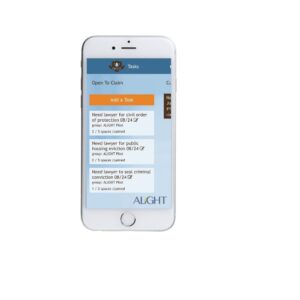
ALIGHT, a nonprofit that helps to connect survivors of human trafficking to free legal help, began with just one attorney, Marianna Kosharovsky.
Since its inception just over a decade ago, Kosharovsky has worked to turn ALIGHT from a solo project to a network of more than 1,500 attorneys spanning a wide range of practice areas.
While Kosharovsky always wanted to be an attorney, she told Law Week that at the onset of her career, she didn’t expect to be doing this type of work. She earned her J.D. from the New York University School of Law and went to work with Milbank on Wall Street doing international corporate transactions and finance.
“Fortuitously, Milbank had an amazing pro bono fellowship program at that time that I wanted to take advantage of, and they placed me with an incredible local domestic violence organization named Sanctuary for Families, which was really ahead of its time in seeing the overlap, and really, the continuation between domestic violence and human trafficking,” Kosharovsky said.
Human rights issues, which were previously a part of her studies, were now her work, as she met and represented individuals who had survived human trafficking but had been professionally and systematically destroyed in the process.
“They had so many different legal needs across so many different areas of law, but they had one attorney, me,” Kosharovsky said. “I could only do one piece, so many different pieces had to come together.”
Some of the issues that Kosharovsky has seen include survivors having children with their abuser, survivors having their financial history and identity taken and destroyed, survivors having criminal histories after being forced to commit crimes and survivors being harassed online.
“I very quickly saw that we are being very, very unfair to people who have been through hell, who are not free the moment that they may physically run away or escape their trafficker,” Kosharovsky said. “Ahead of them they have [to navigate] our complex legal system and [enforce] the rights they’re entitled to.”
As she worked with these individuals, Kosharovsky began to think about where the resource gaps were and how to fill them.
“I understood that we need to bring in technology to work on a bigger scale to be more effective,” Kosharovsky said. “And we also need an army of lawyers, because we need all of those specializations to come in and get coordinated and organized.”
The Birth of ALIGHT
Kosharovsky moved from New York to Denver, but, despite the change in scenery, the problem of trafficking remained. “Trafficking is everywhere, wherever you go, and it’s a huge problem in Colorado,” Kosharovsky said.

But ALIGHT didn’t arise spontaneously. Kosharovsky said she spent a few years on the research and development phase to determine how to address the needs and implement the technology ethically and responsibly.
“The technology we use is like Lyft for human trafficking survivors legal services, where a survivor comes in, they’re screened by our advocate and by an advocate from our community partner. Their issues are scrubbed of any personally identifiable information, their situations are described and pulled out,” Kohsarovsky said. “The family law issue is one legal case, criminal records is another legal case, and the attorneys in our network receive real time notifications of the targeted opportunities.”
“So the family lawyers in Colorado are receiving opportunities for family law in Colorado in real time, and they’re competing like Lyft,” Kosharovsky added. “Who’s gonna jump in to help faster? So we’re playing with that fun element of our profession.”
In 2017, a pilot was launched in Denver with a limited number of partners. Kosharovsky told Law Week that the pilot was a success, and since then, ALIGHT has grown. She cited 2020 as a pivotal year in that growth.
“We started hearing from survivors all across the country who were in trouble, even though we were only really limited to Colorado at that point, so we were looking at expansion,” Kosharovsky said.
That expansion happened, as the network of attorneys grew to more than 1,500 and the organization expanded into Utah and is working on an expansion into the Los Angeles area.
Recently, and coincidentally with its 10-year anniversary, the organization was selected as an awardee of the Supporting Survivors of Modern Slavery Challenge, a collaboration between MIT Solve, the Hewlett Packard Enterprise Foundation and The Anti-Slavery Collective.
“It’s both a financial prize and an accelerator,” Kosharovsky said. “In addition to the prize money, we’re in a cohort, [and] we’re provided with extra resources and expertise.”
She said that the resources from those three organizations will help ALIGHT look into its technology and make it more effective, with the goal to reach more survivors.

As the team works to build out the technology, another important component is building out their roster of attorneys. She noted that ALIGHT was one of the few organizations tackling the issue in the middle of the country, and that it is working to fill that legal desert with more resources and more attorneys.
“It’s a very interesting dualistic process, because we’re not just working with survivors, we’re also engaging and mobilizing attorneys, who get to feel impactful and useful and see how a little bit, or a lot, of your time and expertise can help transform someone’s life,” Kosharovsky said. “And then the attorneys are also affected by being able to be of service, because many of them are experiencing what I experienced, like, ‘How do I even do good, what even makes a difference at this point?’”
Kosharovsky noted that in particular, ALIGHT needed more family lawyers and criminal defense lawyers to help with the issues that trafficking survivors face.
Success Stories
While the work to build and expand ALIGHT goes on, it’s still actively helping survivors. Kosharovsky said that on average, ALIGHT provides survivors with $7,500 in legal value.
“That’s not money that they have and are able to invest in themselves. They’re making these life or death decisions, rent or food, and yet we know if we don’t remove these legal barriers, they don’t have a lasting path to freedom,” Kosharovsky said.
One success story that Kosharovsky highlighted was Megan Lundstrom, who came to ALIGHT to seal the last of her 10 criminal records. She was paired with a criminal defense attorney from Recht Kornfeld.
“He did such an amazing job. She could start then putting her past behind her. She went on to run her own nonprofit, she then moved on to D.C. She does policy and advocacy for other survivors on a national level,” Kosharovsky said.
ALIGHT also contributed to the first labor trafficking conviction in Denver’s history. Kosharovsky said the organization worked with that survivor for many years as the Denver district attorney prosecuted her husband.
“Whatever stage someone is at, some survivors are going back and forth and they have crises come up and they’re not able to continue, they’re really at different points in their recovery, because that journey forward is long and it’s not over for anybody,” Kosharovsky said. “The success is just to be trusted enough and to be able to bring in the legal community to be part of their fight for justice, their fight for their rights.”

